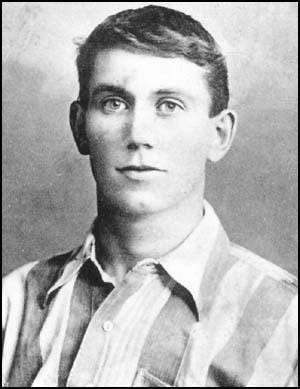02 Oct An Englishman in Bilabo
The story of Billy Barnes, who went from playing for in the east end of London for Leyton, to having a key role in the history of Spanish football.
Players who have made the jump from playing for Walthamstow FC (and its predecessors) to having successful international careers are few and far between.
There’s Alex Akande, who played in 2007 and went on to be a superstar in Hong Kong, gaining citizenship and playing 27 times for the national team. Mo Sagaf, Muhammadu Faal, Boris Kipeya and a few others from Quyam Shakoor’s reign all played in lower divisions in Italy or Belgiu

m before arriving in E17. But there’s one player who could claim to have an impact on an entire country’s footballing history after departing the east end.
William Edward Barnes was born in West Ham on the 20th of May 1879; child to a docker and a coffee shop owner in Silvertown. He began his football career as a 16-year-old at his local Thames Ironworks, playing there for three years, on and off.
His talents were soon noticed by the professional Leyton FC, who were playing in the South Essex League in front of crowds of up to 5,000 at the time. After a short spell at South West Ham, Barnes was quickly signed up.
He was a mainstay in the 1898–99 team, playing at least 28 times and scoring eight goals, but couldn’t help Leyton to the title; his side finishing second behind Barking Woodville. It was clearly too much to take, as with one game of the season left, Barnes made a move north to Sheffield United.
During three years in Yorkshire, Barnes struggled to get into the first team, despite scoring the winning goal in the 1902 FA Cup final and moved back down to London. Feeling more at home, he played over 400 times for West Ham (where he can claim to be only one of 15 players who had played for Thames Ironworks and West Ham), Luton Town and Queens Park Rangers, winning the Southern League twice.
Setting sail
Athletic Club de Bilbao are famed for their Basque heritage; in a fiercely independent corner of France and Spain. Only players from the region can represent the team, even today, but the Club’s early years were built on English foundations. Legend has it that the team’s red and white stripes came from a student who bought 50 Sunderland shirts while waiting for a ship home, and many of the Club’s first players were English dockers and miners who had made the trip to the Basque country for work.
Barnes thought better than to stay at home and fight in the First World War, so in 1914 he sailed to Bilbao to pursue a career as a coach in one of the few football leagues still taking place. As harbingers of the game to Spain, Englishmen were in pole position for hire, and Bilbao with their history of close ties to the English were the perfect match.
Barnes followed another Englishman, Mr Shepherd, into the managerial hot-seat and soon got to work.

Bringing a more direct English style game to the continent, he lead the club to immediate success, winning the Copa Del Rey in his first two seasons. In 1915 his team (pictured above) beat Espanol 5–0, and a year later Englishman Arthur Johnson’s Madrid, soon to become Real Madrid, were defeated 4–0.
Barnes couldn’t avoid the War forever though and returned to England after two seasons “to do his bit”, according to the West London Observer.
At the end of the War, Barnes returned to Bilabo and picked up where he left off, taking Bilabo to another Copa Del Rey final, this time losing to Barcelona who were coached by another Englishman, Jack Greenwell.
A year later though, Barnes made amends, winning a third Copa Del Rey, beating Athletico Madrid 4–1 in the final. Spanish football was resembling an English old boys club by now, with Madrid being managed by Salford-born Vince Hayes.
The game had changed though, with Barnes telling a local journalist “Basque soccer has progressed a lot since I was last here. When I first came it was a patient, slow game of short passing — elegant to watch but total unpractical, Scots style. I introduced at Athletic a fast game with long passing, taking the ball from wing to wing and fast players in the centre capable of scoring goals. Today I find most clubs have a tendency to play this way whereas Athletic seems to have lost its way.” One wonders what Barnes would have made of Barcelona and Spain’s death by 1,000 passes approach to football in the 2000s.
After two seasons, Barnes left Bilbao again, though it’s unclear where he went or why.
Bilbao, clearly thought they were onto a good thing in hiring English managers, and upon Barnes’ departure, the club advertised in the Daily Mail and Sporting Life, drawing hundreds of enthusiastic but unsuitable applications. Mr Burton was appointed as Barnes successor, but having inhaled so much mustard gas in the trenches, died only seven months after accepting the job. Three of Bilbao’s next five managers were English; most notably Fred Pentland who won two La Liga titles and five Copa Del Reys.
Billy passed away in 1962, leaving behind wife Elsie and three children; William, Marjorie and Elsie. William. In a family of seven children, Billy’s brother, Alfred, went on to become minister of transport.


